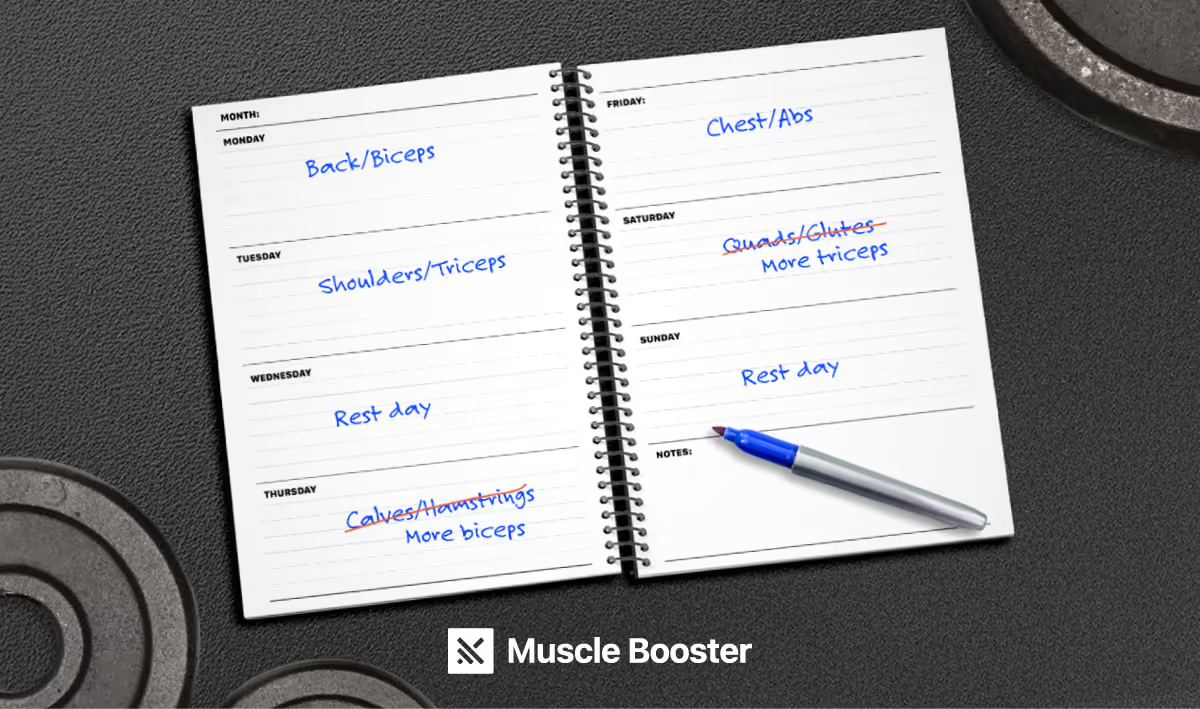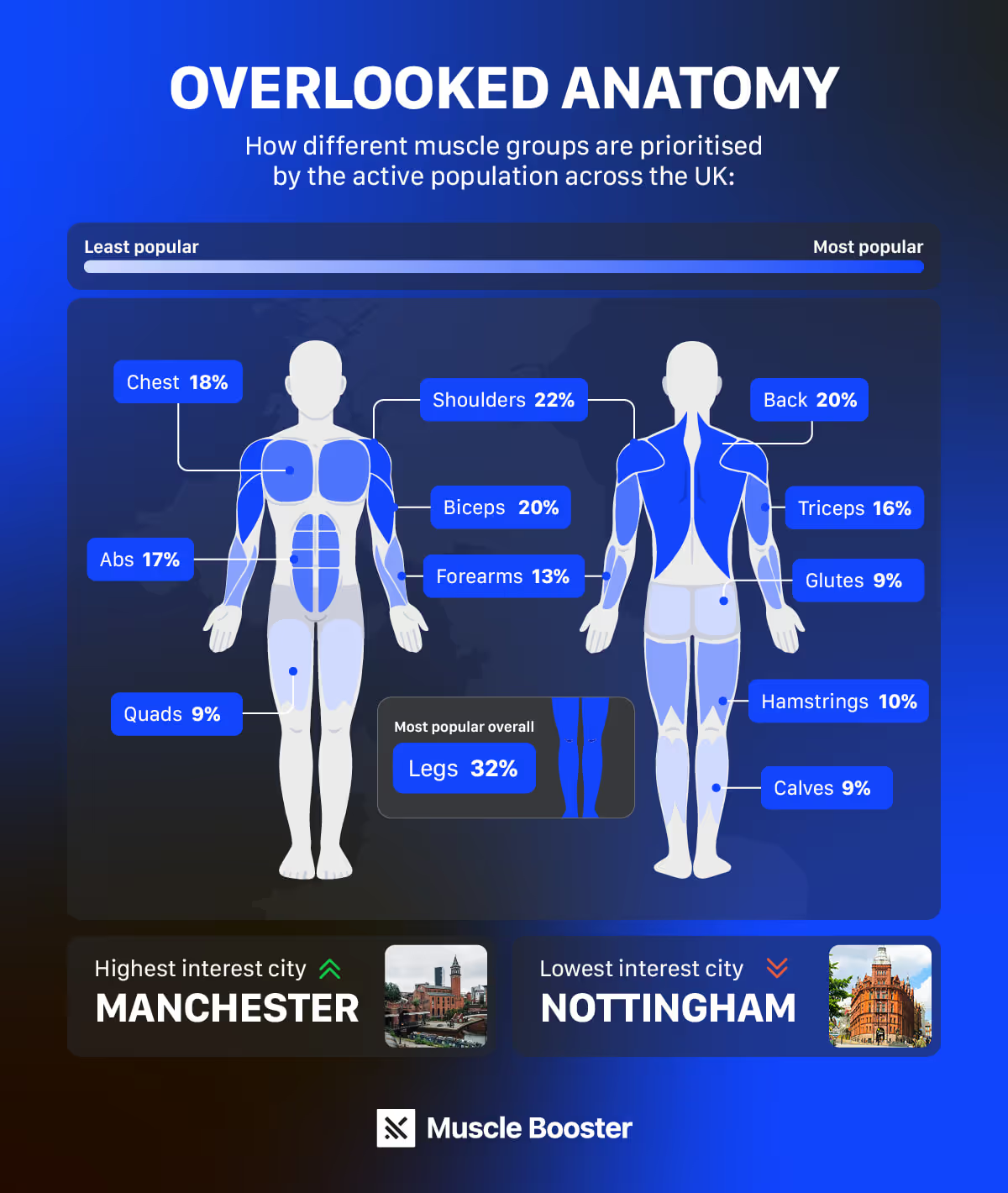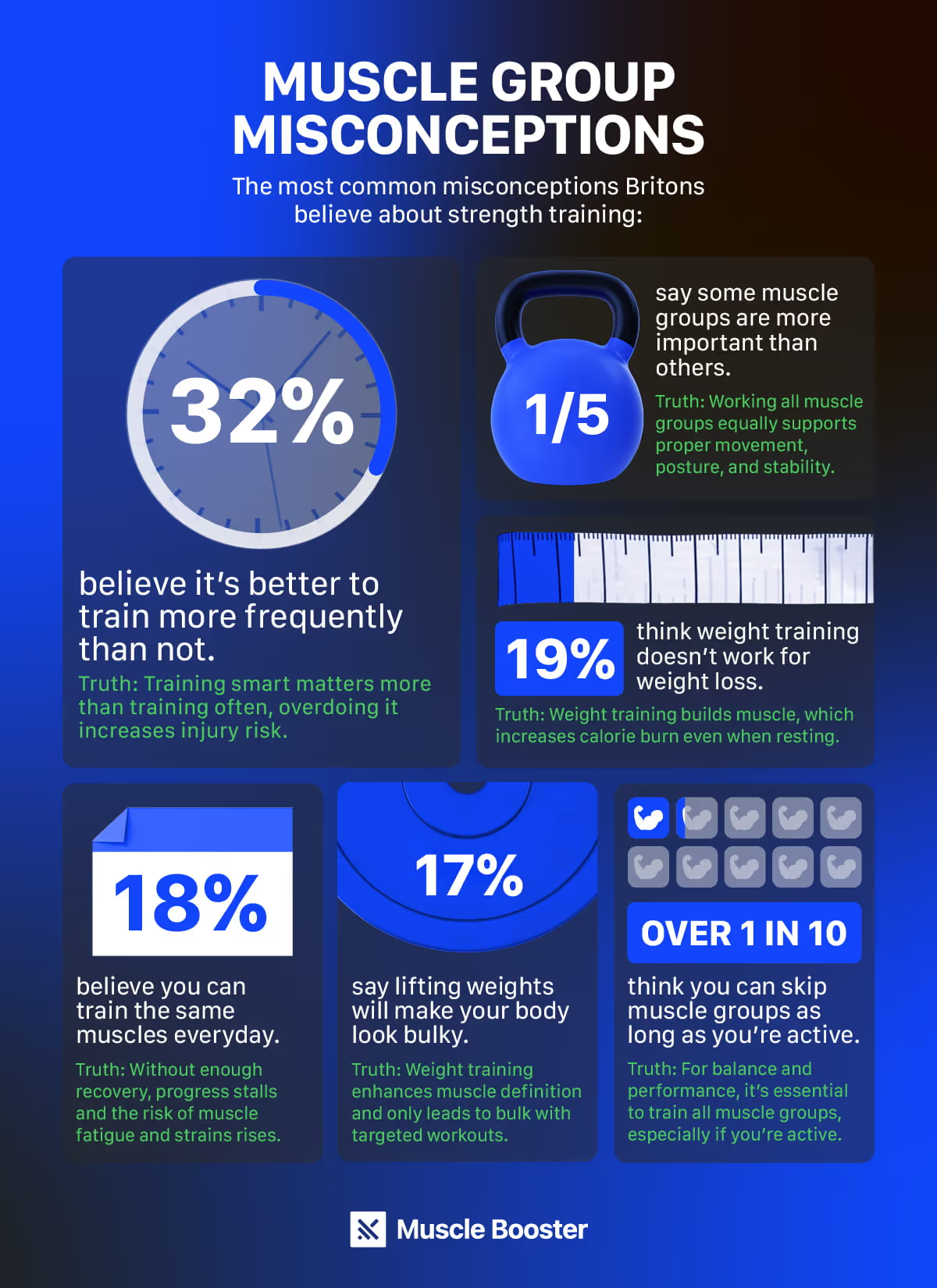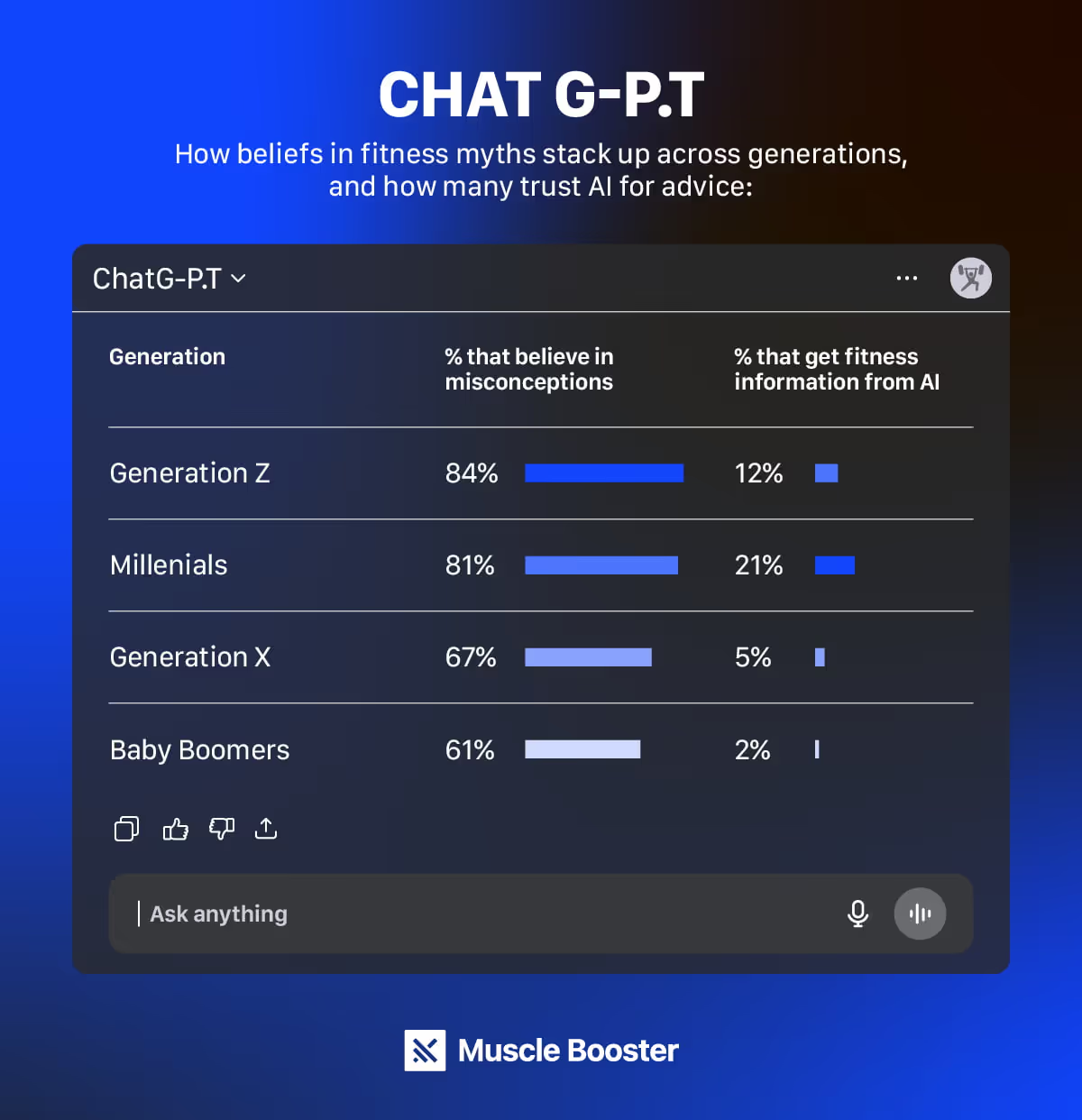
The fitness industry is booming across the United Kingdom, and for good reason. More people
are prioritising their health, starting their own fitness journeys, and exploring different
training methods. But with so much information out there, it’s easy to overlook important details. One common gap? A
tendency to miss out on key muscle groups that could be quietly putting your body at risk.
People are forgetting, or not prioritising core muscle groups, which can cause a multitude
of long-term issues.
To shed light on this issue, Muscle Booster conducted a TLF survey 1 of 1,000 Britons
to uncover the nation’s training habits, including which muscle groups are being neglected. The goal? To raise awareness
and provide practical, expert-backed guidance to help people train smarter, see better results, and feel stronger in
the long haul.
Meet the expert

Bruno Pontes
Bruno Pontes is an ACSM and AFAA-certified personal trainer and group exercise instructor. For the past eight years, he has dedicated himself to helping individuals on their fitness journeys. He believes that fitness is for life and that movement is medicine. Bruno strives to make every workout fun, challenging, and purposeful, tailored to each person's unique needs and goals.
Bruno explains: “A balanced training programme that encompasses all muscle groups is essential, as this is
vital for balance, injury prevention, and long-term performance. Without proper guidance, many risk stalling their
progress, or worse, getting hurt.”
Britons are working out, but 81% are neglecting core muscle groups
UK residents are active, with almost half exercising 2–3 days a week. Cardio tops the list as the most popular
workout, favoured by 59% of respondents, followed by strength training, which is enjoyed by almost a third
(31%).
But our research uncovered a notable imbalance: only 19% give equal attention to
all muscle areas, showing that more than four in five (81%) are neglecting at least one muscle group during their workouts.

Although many might think they are covering all bases when exercising, the numbers tell a different story. While
more than one in three (32%) say they prioritise leg day, critical muscles like calves, quads, and glutes are
getting left behind. In fact, only 9% claim to focus on these three muscle groups, showing a clear discrepancy
between what people think they are training versus what they actually are. Other popular muscle groups include
shoulders (22%), biceps (20%), back (20%), chest and abs (18% and 17% respectively).
When it comes to fitness, age and gender play a major role in shaping workout priorities, and that divide is
especially noticeable in strength training preferences.
Glute training, for example, highlights one of the biggest generational and gender divides. Amongst women, 12%
list glutes as their top training priority, but that focus drops amongst men, where just 5% prioritise glute
work. The gap is also pronounced between generations, with Gen Z focusing on glutes the most (22%), followed by
Millennials (10%) and dropping to 6% for Generation X and Baby Boomers. Instead, men are far more focused on
chest and shoulder workouts (28%), while the older generations cite legs as their primary muscle group.
But it’s not just age that determines how people approach fitness. Geography matters, too.
Looking across the UK, search data2 reveals strong regional differences around targeted strength training.
Cities like Manchester, Newcastle Upon Tyne and Birmingham lead the way with the highest number of people per
search for targeted workout routines, with roughly one search per two people in Manchester, four in Newcastle
Upon Tyne, and five in Birmingham.
These cities also top the table in a people per search ratio when it comes to ab workouts, with Manchester
logging 32,760 searches, Newcastle Upon Tyne 7,680, and Birmingham 21,360. This trend continues across other
muscle groups too, such as back workouts (25,920, 6,600, 18,800) and tricep routines (30,000, 7,440, 17,880),
reinforcing a strong focus on these areas.
In comparison, cities like Nottingham show significantly lower engagement. Nottingham ranks bottom for search
interest in strength training, with just one search for every 20 people. Gateshead and York aren’t far behind,
with one search for every 18 and 17 people, respectively. Nottingham also records the lowest people per search
volume for muscle groups such as forearms (720 searches per year), hamstrings (600), glutes (840) and biceps
(960). Other low performing cities include York for quads (360), Gateshead for abs (600), Cambridge for back
(360).
These contrasts suggest that interest in targeted muscle training varies widely across the country, likely
influenced by differences in regional fitness culture, lifestyle habits, and access to gyms or wellness resources.
What are the dangers of neglecting certain muscle groups?
Raising awareness starts with understanding the risks. When we pay more attention to some muscles and ignore others,
our bodies can become imbalanced, which can lead to injuries, poor functional strength and postural
problems, as well as plateaued performance. Bruno explains:
“Neglecting certain muscle groups in your training doesn’t just limit your strength, it can lead to muscular
imbalances that disrupt natural movement patterns and increase the risk of poor functional strength, postural
problems, and injury over time.
Each muscle group plays a crucial role in maintaining overall body mechanics, and skipping them can have real
consequences. Take the calves, for example. Often overlooked, weak calves can contribute to heel pain, shin
splints, and even hip discomfort. Similarly, undertraining the quads, one of the largest muscle groups, can lead
to knee strains, lower back pain, and postural issues.
The hamstrings are another critical, yet often ignored, muscle group. Strong hamstrings support good posture and
spinal alignment, but when weak, they can contribute to lower back pain. Undertrained hamstrings are particularly
susceptible to injuries such as strains or tears, or even chronic hamstring tendinopathy, where the hamstring
tendons become inflamed and painful if previous injuries don’t heal properly.”
Misinformation is holding people back, as 72% still believe in strength training misconceptions
Many people are unknowingly basing their training routines on outdated or incorrect information, and the issue
is more widespread than many realise. In fact, nearly three in four (72%) of our survey respondents still
believe in at least one common misconception.
Fitness myths don’t just mislead, they hold people back. From training inefficiently to chasing unrealistic goals or
skipping essential exercises, these misconceptions can derail progress. For example, if someone believes strength
training will make them “too bulky” they might avoid it altogether, ultimately missing out on its powerful benefits
for metabolism, posture, and long-term injury prevention.

So, what are the most common fitness myths Britons believe, and how accurate are they?
1. "It's better to train more frequently than not" (32%)
According to our research, this is the most widely believed misconception. Bruno reveals why it's inaccurate:
"Training is important, that’s undeniable, but it's crucial to train
properly rather than frequently. Overtraining can lead to excessive soreness and increase the risk of injury like
strains, tendinitis, stress fractures, and even cartilage damage. Everyone has different training needs, so make
sure you listen to your body and train when you feel ready."
2. "Some muscle groups are more important than others" (20%)
A significant portion of respondents believe certain muscles deserve more attention than others. Bruno disagrees:
"This is simply not true. We are not just one muscle group, our body is an
interconnected system, with muscles working in coordination to support movement, posture and stability. Focusing
too much on one area, like chest or arms, while ignoring others, such as glutes or calves, can create imbalances
that increase the risk of injury."
3. “You can train the same muscles every day” (14%)
Rounding out the top three misconceptions is the belief that training the same muscle group daily is effective. Bruno explains:
“Contrary to popular belief, weight training is highly effective for weight loss. It not only helps build lean
muscle mass, but it also boosts your resting metabolic rate, meaning that the more muscle mass you have, the
more calories your body burns even when you’re not moving. Additionally, weight training often engages
multiple muscle groups at once, leading to a greater overall muscle activation. Depending on the intensity and
duration, it can actually burn more calories than steady-state cardio.”
Our data also revealed some interesting demographic patterns when it comes to fitness misinformation. Men, for
instance, were more susceptible to common workout myths. In fact, 78% of male respondents agreed with at least
one misconception, compared to 67% of women. Age played a role as well, as Gen Z respondents (84%) were
significantly more likely to fall for fitness myths than Baby Boomers (61%).
These trends likely stem from the oversaturation of online fitness advice, where popularity often trumps
credibility. On platforms like Instagram, TikTok, and YouTube, flashy workouts and quick tips go viral, even if
they're rooted in poor science, or even none at all. This may explain why Baby Boomers, who tend to use social media
less frequently, appear less affected by these myths. That's not to say that there isn't accurate and helpful
information available online, it's just making sure you fact-check content and don't always take it at face value.

When asked where they typically seek workout advice, 34% of respondents pointed to YouTube, while 19% cited Instagram or TikTok. Perhaps more concerning, one in three admitted they don’t seek out fitness guidance at all. Notably, more than one in 10 reported turning to AI platforms for workout advice, reflecting a digital shift towards
convenience over credibility, and raising new questions about the quality and accuracy of information people are using
to shape their fitness habits.
How to build a balanced routine
To reduce the risk of issues, or injuries that may come when training one muscle group significantly more than others, it is extremely important to find a well-rounded schedule. Exercises such as strength training, cardio, and yoga or Pilates are ideal, as they target your full body. Including
functional and explosive movements, which consist of techniques designed to improve power and speed is beneficial too,
think box jumps, kettlebell swings, and sprints. These exercises are an incredibly effective way to help you stay at
your best.
For anyone looking to create a well-balanced training routine, Bruno offers some clear and practical guidance:
1. Find what you enjoy
“First, I would start with finding out what you enjoy doing. Whether it’s lifting weights, swimming, dancing or hiking,
building a routine around something you look forward to increases consistency and motivation, both of which are key to
long-term success.”
2. Align your goals and exercises
"Once you've identified what you enjoy, look for exercises that can complement or enhance your performance in those areas.
For example, if you love running, you might want to incorporate strength training for your glutes and hamstrings to improve
endurance. This step helps align your workouts with your personal goals, no matter what they are."
3. Don't ignore undertrained muscles
"Start by focusing on muscle groups that might be neglected in your current routine. These overlooked areas often include
stabilizing muscles like calves, lower back, or hamstrings, all of which play a critical role in injury prevention and balanced strength."
4. Listen to your body, and professionals
"A balanced plan also includes adequate rest, mobility work, and recovery days. Progress doesn't just come from training
hard, but from training smart. Overworking one muscle group while neglecting others will reduce your performance and
halt your progress. If you are ever in doubt about which exercises you should follow it's better
to seek out expert advice rather than just rely on the latest trends."
Remember, exercise should be something that makes you feel good, both physically and mentally. A smart, well-rounded
training plan doesn't just sculpt your body. It protects it. Skipping key muscle
groups may feel harmless in the short term, but over time, it increases the risk of injury and can stall your
progress. The best workout plan is one that strengthens your whole body and supports your lifestyle.
Sources
- In June 2025, we surveyed 1,000 Britons using TLF. Results were then analysed across different demographics such as age and gender
- We pulled search data from May 2024-April 2024 for strength training terms across all core muscle groups in the UK by city and compared this to the active population to calculate the number of people per search






